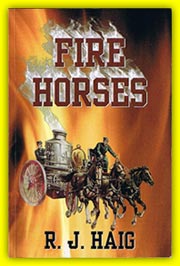Wear and Tear
At two o'clock in the morning the alert goes off. The sleeping Firefighter is jolted out of a deep sleep. As he scrambles into his clothing, his heart goes into high gear. His body responds by dumping adrenaline into his blood stream. Nature’s drug prepares him for action. He is down the pole and into his turnout gear as the fire rig roars to life. He is out into a cold December night with temperatures hovering near the zero mark. About 90 seconds have elapsed and his body has had to contend with a sudden awakening, quick energetic movements, and two temperature changes.
As the rig rounds the corner he sees the top floor of a two flat completely involved in flames. A man with his clothes on fire leaps from a window and crumbles motionless on the concrete driveway. The Firefighter’s body gets another jolt of adrenaline. His heart is pounding and a million years of evolution prepares him to fight.
People are screaming a child is trapped in a rear upstairs bedroom. A ladder is being raised and the Firefighter is running in his bulky gear. He stops momentarily to put on his mask and turn on his air. In a matter of seconds he is up the ladder and into the building. The heat drives him to the floor and the skin on his neck tingles from another extreme temperature change. The room is full of hot, thick, dirty smoke. Panic grips the Firefighter when he realizes he has lost his bearings. He trips on the body of a small child. He snatches up the body and desperately moves along a wall looking for a way out. His mind is racing a mile a minute and his body is functioning at many times a normal rate. He finds a way out and survives another difficult fire.
A short eight minutes have elapsed since the Firefighter was in a deep sleep back at his fire house. In that short time period he has been through extreme temperature changes, excitement, fear, panic, tremendous physical effort, and emotional strain.
This scenario may not happen every day but it happens often enough to shorten a Firefighter's life span. It is a common occurrence in big cities. The smaller departments and volunteer units may not have the same exposure but anyone in the fire service for any length of time will surely experience this type of situation. All the above described events are stressors. The constant career long exposures can lead to heart disease, high blood pressure, and other health problems. These facts are confirmed by studies made by the International Association of Firefighters.
These things are accepted by you men and women who choose to be Firefighters. You are a special breed. It is important that you stay in shape, train as much as you can, and be sure to get a physical at least once a year. The general public has no idea of how hard the job of Firefighting can be. It is important we educate them. An informed citizenship will be the ones who vote on the funding for your fire department.
Stay safe my brothers and sisters.
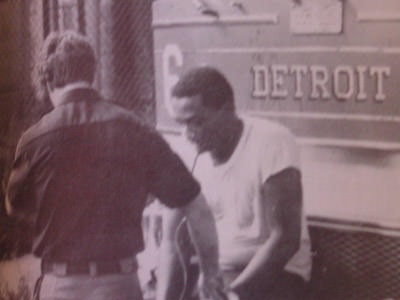
A Firefighter gets air after a difficult rescue.
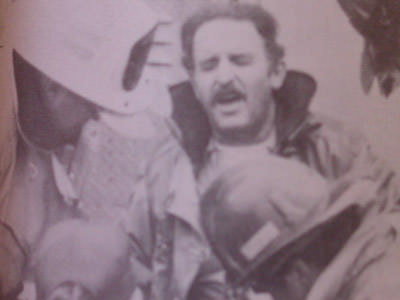
A future Chief of Department pays his dues.
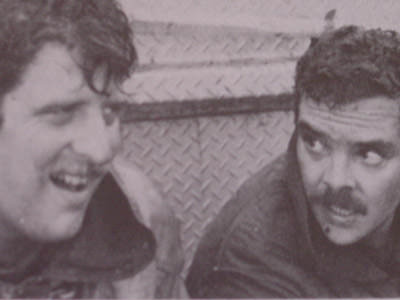
Two squad men take a break after a tough fire.
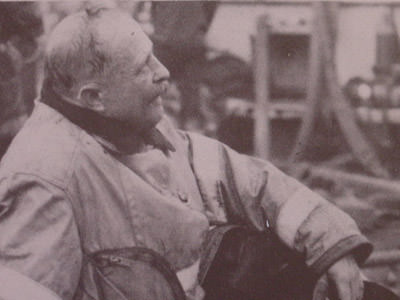
Buggsy Baxter left it all in the fire and
tries to recover outside on the street.
"Fire Talk" Archives
- Benny the Hook
- Got To Love Texas
- The Fog of Retirement
- Two Tough Kids
- On Leaving the Department
- Cop Talk 3, Ceremony
- Putting it on the Line
- A Bond of Love
- God Will Protect Us
- Stealing Fires
- Poo Poo Pants
- Decoy Carver
- Firefighter's Road Trip
- Day Twenty-seven. Road Trip
- Down Mexico Way
- Zoo in the 7th
- A Gentle Landing
- Always a Firefighter
- Christmas at the Firehouse
- Harem Sacrum
- The Crow Who Spoke Polish
- Once a Firefighter always a Firefighter
- A Brotherhood
- Retiring a Hall of Fame Firefighter
- Anatomy of Forcible Entry
- 911
- Old Horses
- The Milk Wagon
- The Howling
- Tales of the Seventh Battalion 26, Destructo
- Memories of the 7th Battalion
- Running Mates
- Engine 32
- Last Alarm
- Tiger Stadium Fire
- To Moosenee and Back
- Memorial Day 2009
- Anatomy of a Fire at a Dangerous Building
- Tales of the Seventh Battalion 25, A Typical 7th Battalion Fire
- Boris the Talking Dog
- Wear and Tear
- Tales of the Seventh Battalion 24, Legends
- Axemen
- Tales of the 7th Battalion 23, Ankie
- Anatomy of a Dwelling Fire
- A Firefighter's Spring
- Input
- My Running Mate
- The Singing Fireman
- The Right Stuff
- Tales of the 7th Battalion 22, A Desperate Rescue
- 300 Spartans
- Tales of the 7th Battalion 21, Men Who Fight Bears
- At the End of His Rope
- Tales of the 7th Battalion 20, Wolf Warriors
- Tales of the 7th Battalion 19, Motorcycle Maniac
- Career Ending Injuries
- Detroit Loses One of Its Finest
- On Duty Injuries
- Unpractical Jokes
- Dedication in the Fire Service
- Tales of the 7th Battalion 18, Spare Parts
- Tales of the 7th Battalion 17, Passage to Hell
- Tales of the 7th Battalion 16, Gallant Warrior
- Tales of the 7th Battalion 15, Big Ones
- Tales of the 7th Battalion 14, Chicago Lil
- Tales of the 7th Battalion 13, Bridge Fires
- Tales of the 7th Battalion 12, Hot Stuff
- Tales of the 7th Battalion 11, Taco Wars
- Tales of the 7th Battalion 10, Day in Hell
- Tales of the 7th Battalion 9, Engine House Cat
- Tales of the 7th Battalion 8, Finding a Pen
- The Polish Squad
- Tales of the 7th Battalion 7, Wayne Soap
- Tales of the 7th Battalion 6, Junk Yard Goat
- The 1967 Riot in Detroit 3
- Department Legends
- Tales of the 7th Battalion 5, The Fonz
- The 1967 Riot (an entry from Tom Hart)
- The 1967 Detroit Riot
- Tales of the 7th Battalion 4, Howard
- The Buhl Building Fire
- Tales of the 7th Battalion 3, Engine 27
- Tales of the 7th Battalion 2, Roof Rescue
- Tales of the 7th Battalion 1, Explosion
- The worst 7th Battalion Fire
- Fire Incidents
- Beeler's Fog Monster
- Thoughts of a Retired Firefighter
- Dogs of the Realm
- Going to the Dogs
- Firefighter/Lawyer ?
- Moe Tales
- The Legend of Moe
- A POEM: When Brave Men Cry

